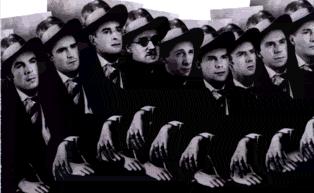

|
|
|
The Pogues (with Kirsty McCall) - Fairytale of New York
Country - Ireland Player - Sean & Brian
 |
 |
| It was christmas
eve, babe, in the drunk tank An old man said to me won`t see another one But then they sang a song 'The rare old mountain dew' I turned my face away And dreamed about you Got on a lucky one They got cars big as bars, they got rivers of gold You´re handsome The boys from the NYPD choir were singing Galway Bay You´re a bum you´re a punk The boys of the NYPD choir were singing Galway Bay I could have been someone The boys of the NYPD choir were singing Galway
Bay |
| Player's comments: | Kirsty MacColl
Kirsty MacColl brought a wit and humour to her songwriting which was rare in modern pop music and led U2's Bono to call her "the Noelle Coward of her generation". She was in many ways a reluctant pop star who put her two children before her career. She made just five albums in 20 years and for more than a decade stage fright meant that she refused to perform live. But she leaves a legacy of memorable songs and was a talent of sometimes startling originality. The daughter of folk legend Ewan MacColl, she signed to Stiff Records at the height of the punk explosion and deserved to have a hit with her 1979 self-penned debut release 'They Don't Know', later a Number Two hit for Tracy Ullman in 1983. 'There's A Guy Works Down The Chip Shop (Swears He's Elvis)' provided her first chart success in 1981, and her reworking of Billy Bragg's 'A New England' four years later - produced by husband Steve Lillywhite - was another hit. Her warm and distinctive voice also made her an in-demand backing singer and she worked with Talking Heads, Simple Minds, The Smiths, Van Morrison and Happy Mondays among others. But it was her role as foil to Shane MacGowan on The Pogues' 1987 Christmas Number Two 'Fairytale Of New York' that gave MacColl her biggest hit. Her 1989 album 'Kite' included the hit singles 'Free World' and 'Days', a version of the old Kinks' classic. Two years later 'Electric Landlady' (a playful reference to Jimi Hendrix's 'Electric Ladyland' album) found her co-writing with Johnny Marr of The Smiths and Mark E Nevin of Fairground Attraction. The album also included the song 'My Affair', on which she worked with Cuban musicians and which was to be a pointer to her future musical direction. After the 1994 album 'Titanic Days', which chronicled aspects of her divorce from Lillywhite, she began travelling regularly to Cuba and Brazil, falling in love with Latin rhythms. She would return from her trips with suitcases full of albums and also took lessons in Spanish and Portuguese. These travels eventually inspired her last album 'Tropical Brainstorm', released in April 2000, which married her clever, satirical and very British songwriting to the Cuban and Brazilian grooves she so loved. Many regarded it as her best and most consistent album of her career. She had just completed recording a six part series of programmes about Cuban music which were due to be broadcast on BBC Radio 2, but have been postponed as a mark of respect. The esteem with which she was held by her fellow musicians is evident on the tributes which adorn her 1995 greatest hits collection, 'Galore'. Shane MacGowan described her as "one of the great one-offs", Morrissey praised both her bust and her songwriting and called her "a supreme original" while Billy Bragg said she "writes like a playwright, sings like an angel". The Pogues By demonstrating that the spirit of punk could live in traditional Irish folk music, the Pogues were one of the most radical bands of the mid-'80s. Led by Shane MacGowan, whose slurred, incomprehensible voice often disguised the sheer poetry of his songs, the Pogues were undeniably political. While the band was clearly radical, they also had a wickedly warped sense of humor, which was abundantly clear on their biggest hit, the fractured Christmas carol "Fairy Tale of New York." The group's first three albums -- Red Roses for Me, Rum Sodomy & the Lash, If I Should Fall From Grace With God -- were widely praised in both Britain and America, and by 1988 they had earned substantial cult followings in both countries. Yet MacGowan's darkly romantic, wasted lifestyle, which was so key to their spirit and success, ultimately proved to be their downfall. By the end of the decade, he had fallen deep into alcoholism and drug addiction, forcing the band to fire him if they wanted to survive. The Pogues carried on without him in the early '90s, playing to a slowly shrinking audience, before finally disbanding in 1996.Shane MacGowan, an Irish punk inspired by the Clash, formed the Pogues in 1982 after playing with the London-based punk band the Nipple Erectors, a group which was later called the Nips. MacGowan met Spider Stacy in a London tube station, where Stacy was playing a tin whistle. The two began working together, drafting former Nip Jim Fearnley to play guitar. Naming themselves Pogue Mahone -- a Gaelic term meaning "kiss my ass" -- the trio began playing traditional Irish tunes in London pubs and streets, eventually adding Jeremy Finer (banjo, guitar), Andrew David Ranken (drums) and Cait O'Riordan (bass) to make it a full band. As the group developed into a sextet, they added MacGowan's original songs to their repertoire, and began earning a reputation as a wild, drunken and exciting live act. Shortening their name to the Pogues, the group released an independent single, "Dark Streets of London," in early 1984 and supported the Clash on their summer tour. By the fall, they had signed with Stiff Records and had released their acclaimed debut, Red Roses for Me. Red Roses for Me was a critical hit, establishing the Pogues as one of the most vital, and certainly one of the most political, bands in Britain. Early in 1985, they added guitarist Philip Chevron and recorded Rum Sodomy and the Lash with producer Elvis Costello. The album was an underground success and was widely praised, especially for MacGowan's songwriting -- not only in the U.K., but also in the U.S., where they were becoming college radio staples. By 1988, O'Riordan had left the band to marry Costello, and she was replaced by Darryl Hunt; banjoist Terry Woods was also added to the band. Early in 1988, they signed to Island Records and released the Steve Lillywhite-produced If I Should Fall from Grace with God later that year. The album became the group's biggest hit, generating the number two U.K. single "Fairytale of New York," which featured vocalist Kirsty MacColl. |